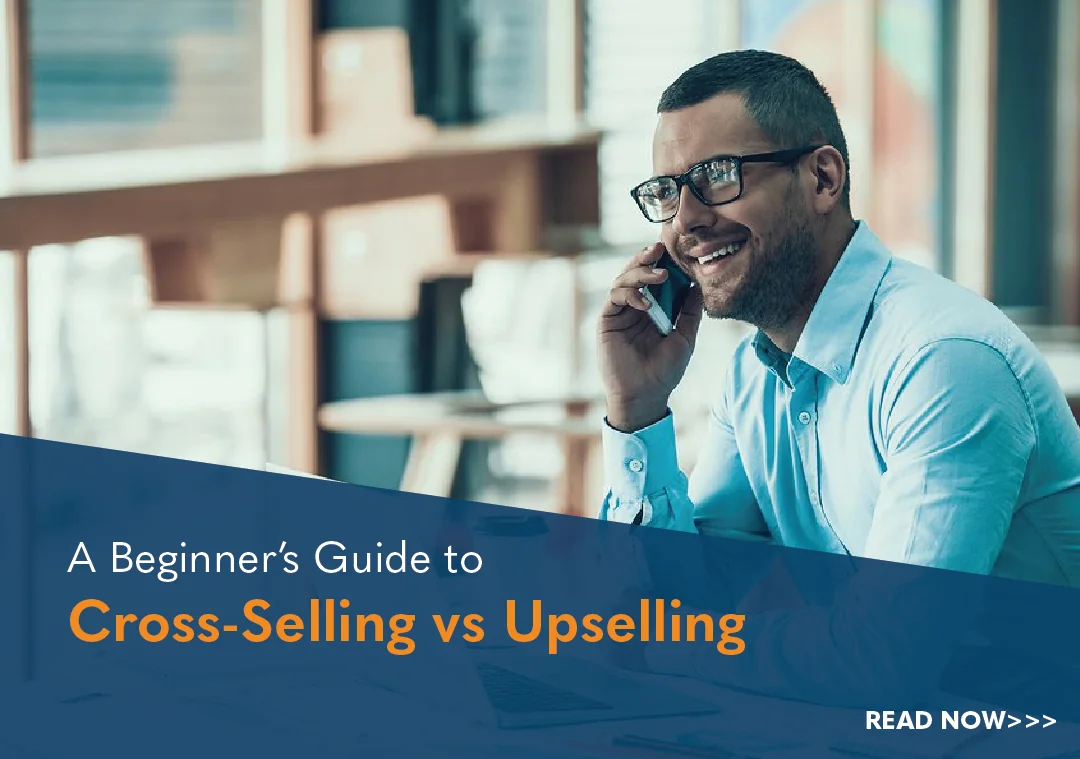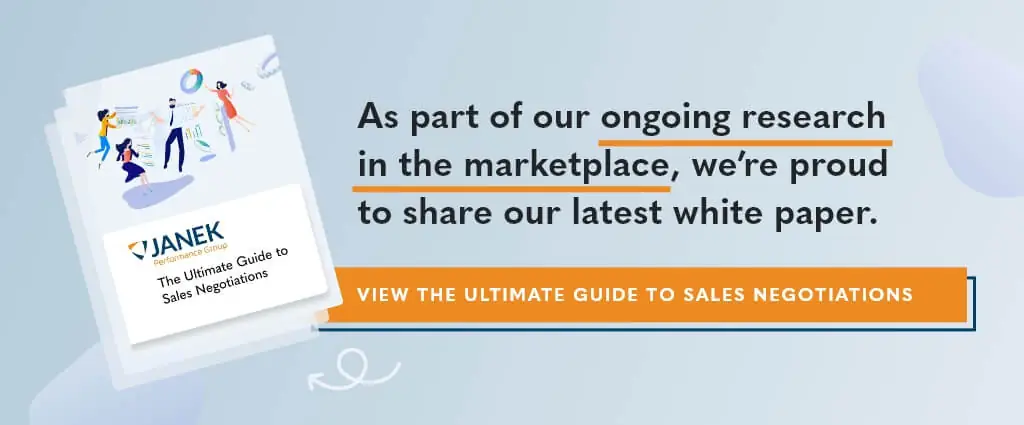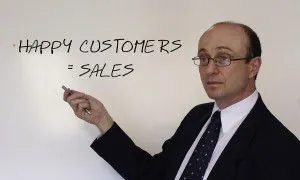What is the Difference Between Cross-Selling and Upselling?

The common sales advice is that one of the best ways to increase revenue is to utilize cross-selling and upselling. Indeed, as Marketing Metrics notes, existing customers are 60-70% likely to purchase, compared to just 5-20% for new prospects. But some sales professionals conflate the two, when they’re two distinct things. More importantly, understanding the difference can help sales reps become more aware of when to cross-sell and when to upsell (Spoiler Alert: Each one has different ideal selling situations).

What is Cross-Selling?
Definition: Offering products outside the original purchase that fulfill and solve additional needs and problems that the original product doesn’t.
For example, a bank officer might originally sell a checking account, then cross-sell by offering the bank’s credit card. Or a camera sales rep might cross-sell by offering items such as a tote to carry the camera in.
Purpose: To anticipate needs the customer might not even be aware of and to increase customer knowledge of the supplier’s offerings.
For example, a few years ago, I purchased a camera. One of the items cross-sold to me was an additional camera battery. While I didn’t think of it initially, having that backup battery definitely came in handy on family vacations when I forgot to charge the initial one the night before, or when I shot video that depleted the battery sooner than expected. Rather than miss out on capturing precious memories, I simply swapped out the battery.
Outcome: Repeat purchases, extended life-time value.
Ideal Selling Situation: Most often at the end of the sale, but for lengthy or complex selling cycles, it should be integrated into the selling process. For some verticals, cross-selling can occur after the initial sale is completed.
For example, say you’ve sold car insurance to a pair of newlyweds and find out later that they have a child on the way. Then would be an excellent opportunity to cross-sell by offering life insurance to secure their child’s future.
What is Upselling?
Definition: Offering higher-end products or upgrades with a correspondingly higher price tag to provide greater value to the customer.
The classic example of upselling, often used in comedy routines, is a McDonald’s employee asking the customer if they would like a hot apple pie with their order. It’s an upgrade to the eating experience, because it brings dessert into the mix.
Purpose: To create greater customer satisfaction by providing a higher value product or service that better and more comprehensively addresses customer needs
Outcome: Increase in average deal size and likelihood of repeat purchase.
Ideal Selling Situation: Like cross-selling, frequently at the end of the sale. However, upselling occurs less frequently at sales close (we’ll get into why in just a bit) and is more often utilized after the initial sale.
As an example, let’s say you’re a sales rep for a tech services company. You have a client that’s interested in signing on with you and initially is looking at the 8-5 support availability in your base plan. But this is a company that operates in multiple time zones and you see an opportunity to upsell them to the plan with 24 hour customer support, which will allow coverage for all the time zones – in addition to covering any off-hours IT emergencies that happen to arise, such as a critical server going down.

Dos and Don’t of Cross-selling and Upselling
- Do keep the offerings limited. Too many choices and information overload results in analysis paralysis and a lost sale. Focus on just a few items that provide immediate and obvious benefits to the customer. Remember, this is about a long-term relationship – not a quick one-off sale.
- Do know what products bundle well together in a cross-sell. Over time, you’ll learn the natural complements that fit in a cross-selling process and when to offer them. Creating a database or cheat sheet for yourself will streamline this process – but pay attention to the individual customer’s specific needs!
- Do ask questions to get at the heart of customer needs when cross-selling or upselling. If you don’t understand the client’s precise needs, you won’t be able to recommend the right product or solution to them. You’ll also misfire on cross-selling and upselling opportunities. To avoid that, ask the right questions to dig deep at identifying the customer’s needs.
- Don’t aggressively upsell. While upselling has a lot of benefits for both customer and sales rep, going for the wrong upsell opportunities can backfire and make it appear as if you only care about getting a bigger sale, rather than truly addressing a customer’s needs. That young family on a budget looking for a basic minivan doesn’t need the luxury trim line and could well resent an upsell attempt – even to the point of walking away from the transaction.
- Ideally, don’t just offer the upsell or cross-sell – tie it explicitly to customer needs. If you’re simply upselling or cross-selling without demonstrating how the opportunity fits into identified customer needs, it may come across purely as a sales approach focused on you and your compensation. When possible, tie the offer to the customer’s needs that were shared and present the details in a way that puts the customer first in the offer.
When is the Best Time for Upselling and Cross-Selling?
The point of sale is the most opportune time for cross-selling and up-selling. If a customer understands how X product will meet his/her needs and has decided to purchase, then they will also appreciate the opportunity to evaluate how Y and Z might enhance the performance of X. They won’t re-evaluate their decision to purchase X simply because you’re talking about Y and Z (after all X still meets their needs). What they will be concerned with evaluating is the added value that Y or Z might bring, and if that added value warrants the additional cost. Rather than being a salesperson who is “selling,” you are a consultant/advisor in a position to help them evaluate.
Another optimal time for cross-selling and up-selling is new customers and accounts. Studies show that the majority of cross-sell and up-sell success is with customers who are just coming on board or who are still new (within the first 6 months of service). For this reason, customer service departments are good resources for potential cross-selling and up-selling opportunities. Customer service representatives who are in contact with existing customers regularly should be trained to recognize when a customer’s needs are changing and could benefit from an upgrade or addition to their current product/service.
Upselling and cross-selling are fantastic ways to ramp up revenue, increase repeat patronage, bolster customer loyalty and satisfaction, and extend the expected customer lifetime value. But they need to be offered at the right time and linked to the client needs you’ve uncovered in the discovery process – whether at the close of the sale or later on in the business relationship.


- Account Planning (11)
- Awards (49)
- Client Testimonial (37)
- Personal Branding (19)
- Podcast (11)
- Research (70)
- Sales Career Development (87)
- Sales Coaching (156)
- Sales Consulting (137)
- Sales Culture (170)
- Sales Enablement (354)
- Sales Leadership (109)
- Sales Management (248)
- Sales Negotiation (16)
- Sales Prospecting (125)
- Sales Role-Playing (18)
- Sales Training (235)
- Selling Strategies (263)
- Soft Skills (70)
- Talent Management (94)
- Trusted Advisor (27)
- Virtual Selling (49)
- Webinar (9)


























